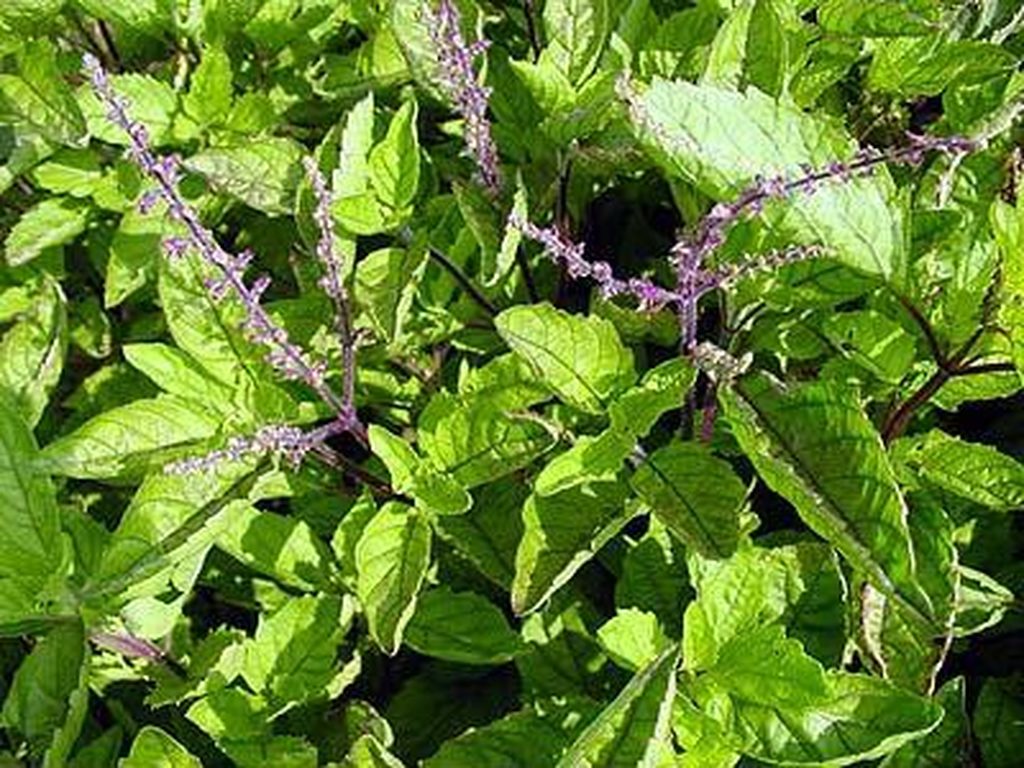Basil, Holy/Tulsi

Also known as Ocimum sanctum, Tulasi (Sanskrit name)
Introduction Holy Basil is commonly grown in Hindu homes and it is a sacred plant in the Hindu religion. Native to India, Tulsi has a long tradition of use in Ayurvedic medicine. The Latin name Ocimum sanctum means ?sacred fragrant lipped basil? or "the incomparable one" . Holy Basil has also been called the 'Queen of Herbs' and 'The Elixir of Life.' It is a very important herb in Ayurvedic medicine, and has only recently been discovered and revered by western medicine.
Constituents Eugenol app., B-caryophyllene, sesquiterpenes, monoterpenes viz -pinene, -sitosterol, -elemene, bornyl acetate, methyleugenol, neral, camphene, a-pinene, ursolic acid, campesterol, cholesterol, stigmasterol, and methyl esters of common fatty acids.
Parts Used The leaf.
Typical Preparations Tulsi is traditionally taken as an herbal tea, dried powder, fresh leaf, or mixed with ghee.
Summary Holy Basil, or Tulsi, is an important symbol in the Hindu religion and it is a significant herb in ayurvedic medicine. Holy Basil has been used for thousands of years as a prime herb in Ayurvedic treatment, and is mentioned in the Charak Samhita (the central teaching of Ayurvedic medicine) which was written at least two thousand years ago. In India, Hindus grow Tulsi as a religious plant in their homes and temples, and the leaves are an important part of their meditation and worship. Holy Basil is used in Ayurvedic medicine for common colds, headaches, stomach disorders, inflammation, heart disease, various forms of poisoning, and malaria. Holy Basil is considered an adaptogen, which means that it assists the body adapt to stress (environmental, physical, or chemical), restore balance in the body, and normalize body functions. It is currently being studied for its beneficial properties and has been found to be effective for cancer, diabetes, high cholesterol levels, stress, wound healing, the immune system, inflammations, liver support and protection, hypoglycemic conditions, ulcers, digestion, chronic fatigue syndrome, arthritis, radiation poisoning, cataracts, the memory, respiratory system, urinary problems, eczema, psoriasis and other skin conditions, and it is an antioxidant.
Precautions Not recommended for use if pregnant, nursing, or are considering becoming pregnant (may have an anti-fertility effect). Do not administer to infants or toddlers. May lower blood sugar, consult a doctor if hypoglycemic (in separate studies, it has also been shown to be beneficial for those with hypoglycemia). Holy Basil has mild blood thinning properties.
PURCHASE HOLY BASIL/TULSI EXTRACT HERE
For educational purposes only.This information has not been evaluated by the Food and Drug Administration. This information is not intended to diagnose, treat, cure, or prevent any disease.
This information courtesy of MOUNTAIN ROSE HERBS, with full, written permission for reuse.







